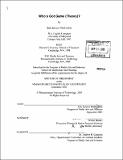Who's got game (theory)?
Author(s)
Blankinship, Erik Jackson, 1974-
DownloadFull printable version (13.18Mb)
Other Contributors
Massachusetts Institute of Technology. Dept. of Architecture. Program In Media Arts and Sciences
Advisor
Walter Bender.
Terms of use
Metadata
Show full item recordAbstract
Many players enjoy the challenge of outwitting computer opponents in strategy games. Devising strategies to defeat a computer opponent may enhance certain cognitive skills (e.g., analysis, evaluation, planning). This thesis takes a constructionist approach to gaming, hypothesizing that players may learn more about strategic planning by building their own computer opponents and then playing them to understand how their strategic theories play out in real experiments. I have developed a graphic toolkit for designing strategy games and computer opponents. The goal is to help students learn the underlying mathematical and computer science theories used to win these games. The tools have been designed to eliminate the overhead of using conventional programming languages to build games and focus students on the pedagogical issues of designing and understanding game theory algorithms. I describe the tools as well as initial evaluations of their effectiveness with populations of teenage students. Teenagers in this study posed their own problems, in the form of games they designed, and then hypothesized about winning strategies. Of their own volition, most teenagers iterated on their strategic designs, reformulated problems and hypotheses, isolated variables, and informed next generation versions of this tool with astute suggestions. (cont.) The toolkit designed for this thesis has a low floor, making it easy for people to quickly start playing with mathematical concepts, and a high ceiling for sophisticated exploration.
Description
Thesis (Ph. D.)--Massachusetts Institute of Technology, School of Architecture and Planning, Program in Media Arts and Sciences, 2005. Includes bibliographical references (leaves 85-88).
Date issued
2005Department
Program in Media Arts and Sciences (Massachusetts Institute of Technology)Publisher
Massachusetts Institute of Technology
Keywords
Architecture. Program In Media Arts and Sciences